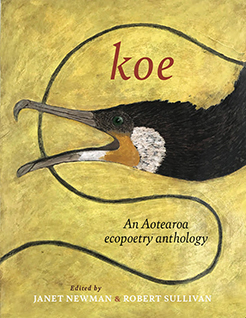Edited by Janet Newman and Robert Sullivan
Koe invites readers to explore human connections with nature through a selection of over 100 poems composed in Aotearoa New Zealand from pre-European times to the present day. Including a substantial introduction and editors’ notes, Koe is the first anthology to provide a comprehensive overview of ecopoetic traditions in Aotearoa and to locate these traditions as part of the global ecopoetry scene.
In Koe, editors Janet Newman and Robert Sullivan reveal the genesis, development and heritage of a unique Aotearoa New Zealand ecopoetry derived from both traditional Māori poetry and the English poetry canon. Organised chronologically into three sections—representing the early years (poets born in or before the nineteenth century), the middle years of the twentieth century, and the twenty-first-century ‘now’—each segment presents a diverse array of voices. Across all these time frames, speaking from the conditions of their era, the poets delve into themes of humility, reverence and interconnectedness with the nonhuman world. They challenge traditional Eurocentric perspectives, highlight the significance of indigenous narratives, and wrestle with the impacts of European colonisation.
With more than 100 poems of celebration, elegy, apprehension, hope and activism, Koe gives us the history that holds our future.
Editors
Janet Newman lives at Koputaroa in Horowhenua. She has a PhD from Massey University for her thesis ‘Imagining Ecologies: traditions of ecopoetry in Aotearoa New Zealand’ (2019). Her essays about the sonnets of Michele Leggott and the Romantic ecopoetry of Dinah Hawken won the Journal of New Zealand Literature Prize for New Zealand Literary Studies in 2014 and 2016. She won the 2015 New Zealand Poetry Society International Competition, the 2017 Kathleen Grattan Prize for a Sequence of Poems and was a runner-up in the 2019 Kathleen Grattan Awards. Her first collection of poems, Unseasoned Campaigner (OUP, 2021), won the 2022 New Zealand Society of Authors Heritage Book Award for Poetry.
Robert Sullivan (Ngāpuhi, Kāi Tahu) is the author of 10 books of poetry, a graphic novel and an award-winning book of Māori legends for children. His most recent poetry collections include Tūnui | Comet (AUP, 2022) and Hopurangi—Songcatcher: Poems from the Maramataka (AUP, 2024). Robert is the co-editor of anthologies of Polynesian poetry in English, Whetu Moana (AUP, 2002) and Mauri Ola (AUP, 2010), alongside Albert Wendt and Reina Whaitiri. He’s also the co-editor of an anthology of Māori poetry, Puna Wai Kōrero (AUP, 2014), with Reina Whaitiri. Among many awards, he received the 2022 Lauris Edmond Memorial Award for a distinguished contribution to New Zealand poetry. He is associate professor of creative writing at Massey University and has taught previously at Manukau Institute of Technology and the University of Hawai‘i at Mānoa.
Publication details
Paperback with flaps
170 x 220mm, 315pp
9781990048814
RRP $50
Release date: 22 August 2024
Reviews and Interviews
New Zealand Listener Top Poetry Books Of 2024: The Best NZ Verse
'Through 200 poems from the 19th century to the present time, the editors monitor the ecological health of Aotearoa. Including poems about felling trees to protests against nuclear weapons and fears about rising seas, this anthology is wide ranging and informative.' Read
Review: 'As much as it is a record of the harm we do to ourselves by harming our environment, it also records how we slowly learn, and how we might correct some of our errors.' – C. K. Stead reviews Koe for the Times Literary Supplement Read
Review: 'Newman and Sullivan's editorial choices skilfully highlight the unique contributions of both tangata whenua and tangata tiriti. The editors take care to position Māori oral traditions and song poetry alongside English poetic forms, acknowledging both the deep cultural histories and the ongoing impacts of colonisation on Aotearoa’s landscape and its peoples. The inclusion of poems in te reo Māori (with translations) further enriches the collection and ensures that the Indigenous voices at the heart of New Zealand’s ecopoetry are not overlooked.' – Chris Reed for NZ Booklovers Read
Review: 'Koe in Māori refers to the cry of a bird, but also the pronoun ‘you’ – making it the perfect title for a poetry collection reflecting New Zealanders’ relationship with nature. The book’s sweeping time span captures a poignant change in tone, from the warnings of nineteenth century bushwhackers to angry missiles and laments from writers describing profound ecological damage. The work of 114 poets are collected here; Pākehā, non-European settlers, Pacific peoples and Māori, some lost to the mists of time, their words translated by Patricia Grace.’ – Jenny Nicholls for Waiheke Weekender.
Review: 'As the nation reels from events like 2023 Cycline Garbielle and questions like environmental regressive-ness of legislation like the Fast-track Approvals Bill, this feels like a collection for our times. But the breadth of the works presented here reminds us that our times began a while ago.’ – Laura Williamson for 1964: Mountain Culture Aotearoa (Issue 20, Summer 2024/25)
Review: 'The Māori part of the anthology’s title carries a wealth of meaning in its three letters. “Koe” can signify a scream as well as a bird call, but the word is most familiar to us in the phrase ‘tena koe’, the greeting used for one-on-one encounters. Since each of us is being addressed intimately and individually, how can we readers pretend not to hear the cry of distress or act as if the parlous state of the planet is somebody else’s business, not ours?' – Iain Sharp for Landfall Read
Review: Elizabeth Heritage reviews Koe for Kete Books Read